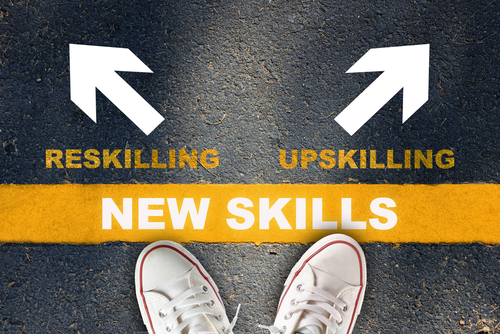Upskilling enhances and broadens an individual’s skills while reskilling involves acquiring new skills for a different job or career. In this era of automation, both upskilling and reskilling have become crucial since they allow workers to adjust to evolving technologies and job demands.
People often use the term “future of work,” I believe a significant portion of that future has already arrived. Automation and artificial intelligence (AI) are increasingly impactful in many industries. As technology advances, many jobs will become automated, and new roles will require new skills and knowledge. ChatGPT, Large Language Models (LLMs), and sustainability are the latest emerging skills.
In most cases, these technologies, knowledge, and capabilities are so new or change rapidly that organizations cannot acquire them through talent alone. This shift is creating a growing need for upskilling and reskilling to ensure workers can stay relevant and competitive in the job market. While some businesses approach these new trends skeptically and hesitate to adapt, they should seize the opportunity. The World Economic Forum found that by 2023, 1 billion people will be equipped with the skills needed for the future.
The fear and mistrust of AI are understandable, given the portrayal of AI in iconic sci-fi movies like 2001: A Space Odyssey, The Terminator, War Games, and others, which dramatize AI failures and the ultimate triumph of humanity. However, these are fictional portrayals. There’s no need to battle against AI; instead, we should view AI as a new team member that augments human innovation. AI can handle tasks that are too tedious, voluminous, complex, or impractical for humans. With AI, we can accomplish more and concentrate on tasks that demand human creativity and expertise.
According to an MIT study, workers using ChatGPT reported a 37% increase in productivity. AI can complement our work, but it shouldn’t be seen as a replacement for the human workforce. We can better understand this by prioritizing learning at work and encouraging employees to actively learn about automation instead of fearing it. Business leaders can utilize AI to invest in their employees by providing upskilling and reskilling opportunities, increasing retention, improving employee satisfaction, and filling skills gaps.
The Importance of Reskilling and Upskilling in an AI-Driven Work Environment
Reskilling involves learning new skills to adapt to new job requirements while upskilling enhances existing skills to improve performance in the current job.
There are several reasons why reskilling and upskilling are important in an AI-driven workplace:
- Staying competitive: Workers with the latest skills are more likely to be hired and promoted.
- Increasing job satisfaction: Engaged workers are more satisfied with their jobs.
- Improving productivity: Skilled workers are more efficient.
- Reducing the risk of job displacement: Adaptable workers are less likely to be replaced by automation.
- Upskilling and reskilling are important as they can lead to higher wages and better job opportunities. Workers with new skills or knowledge are often more valuable to employers and can command higher salaries. Additionally, workers with diverse skills are more attractive to potential employers due to their broader range of experience and expertise.
- Boosting retention: Employees value businesses that support their growth. According to LinkedIn’s 2023 Workplace Learning Report, the opportunity to learn and acquire new skills significantly influences job considerations. Moreover, Gallup’s American Upskilling Study found that nearly half of Americans (48%) would switch jobs for skills training opportunities.
Reskilling and upskilling are crucial in the face of the AI-driven workplace revolution. As technology rapidly advances, adapting to new roles (reskilling) and enhancing existing competencies (upskilling) become essential. Embracing AI, such as ChatGPT and large language models, is critical, as studies demonstrate significant productivity gains.
Reskilling and upskilling meet the demands of the evolving job market and cultivate a culture of continuous learning, positioning individuals and organizations for success in the AI-driven landscape. The future has arrived, and through strategic skill development, we can confidently embrace opportunities and navigate challenges in the ever-evolving world of work.
Mike Szczesny is the owner and vice president of EDCO Awards & Specialties, a dedicated supplier of employee recognition products, crystal trophy, branded merchandise, and athletic awards. Szczesny takes pride in EDCO’s ability to help companies go the extra mile in expressing gratitude and appreciation to their employees. He resides in Fort Lauderdale, Florida.

